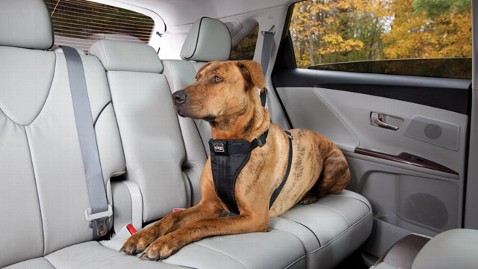N.J. May Become First State to Require Seat Belts for Pets

(Image credit: Amazon)
The fines would not apply to pets kept in crates.
Endorsed by New Jersey's Society for the Prevention of Cruelty to Animals, legislation to require seat belts for pets has been in discussion in the state at least since the summer, not that such a bill doesn't have its critics, who argue that more attention should be paid to the state's budget deficit and 9.9 unemployment rate.
But Spencer defended the bill saying, lawmakers are "taught to multi-task."
"This doesn't limit my ability to address other issues for the people of New Jersey," she said.
Other states, such as Hawaii, Connecticut, Illinois and Maine have banned motorists from driving with pets in their laps, but New Jersey is apparently the first state to require that pets be strapped in.
Whether New Jersey's and similar bills become the law, Melissa Ramirez, founder of Chicago-based Zerimax, which makes seat belts for pets, is already filling a new market niche. Launched in May, Zerimax was named in part after Ramirez's dog Max, a miniature Pinscher, that became paralyzed in a car accident in 2008. While airbags protected the driver, Ramirez's husband, Max was thrown across the car. Determined to protect other pets, Ramirez sells a variety of harnesses that range in price from $20 to $30.
"There was a void in the market with devices that were easy to use," she said. "There are a lot but they were cumbersome and difficult." Ramirez, apparently, is filling this void.
Zerimax's sales have quadrupled every month since the company's launch in May, according to Ramirez, who has a marketing background. With a Groupon deal that starts Sept. 22, Ramirez expects to make about $70,000 in sales by the end of the year, even without pet seat belt legislation requiring them.
But she cautions that if a bill such as New Jersey's becomes law and other states adopt similar measures, cheap products could flood the market. Ramirez urges customers to look for quality when it comes to securing their pets.
"Check that items are sewn and not glued," she said, and choose metal over plastic, she said. Make sure the safety device fits your pet properly. "Thirty pounds of dog can be distributed differently in a Greyhound," she said. "Not all devices out there will fit your dog." Ramirez suggests owners measure their pets and understand their girth.
"It would help to create standards so if the category grows," said Ramirex, " it grows properly."